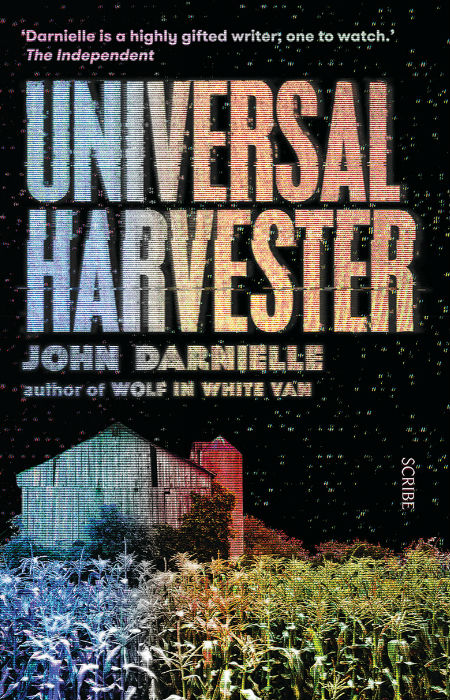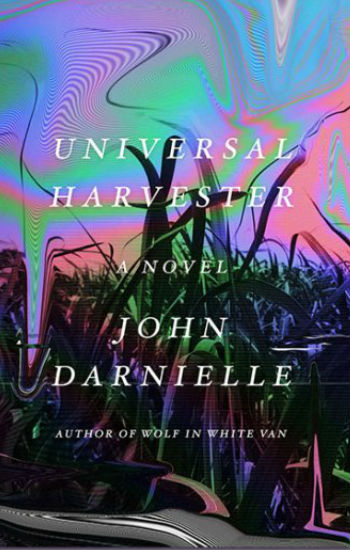
Life, pretty much any way you stretch it, is disconcerting.
Few of us actually admit to such a thing since to do so would be to admit that the bricks-and-mortar sanity of the everyday, the bills, the commute and the meals that anchor us to comfortingly set routines, is not the sum total of existence.
Admitting that there’s more to life below the surface would be to admit that there are things way beyond our control, appealing in some sort of upsetting the banality of the day-to-day, but largely, a problem if we want to feel comfortable, secure and okay about being alive.
John Darnielle’s second novel, Universal Harvester (it follows 2014’s Wolf in White Van) seditiously slides in around these supposedly strong, high barriers, taking us into a world with the reassuring markers of late ’90s modernity – the video rental store, the incipient world wide web, the first cell/mobile phones – that has far more lurking just out of sight that anyone is entirely relaxed with.
The setting, a series of small towns in rural Iowa (Ames, Nevada and Collins) where life moves to certain rhythms and people draw strength from that, belies the darkness that may be scooting about in the shadows of ordinary objects, in this case VHS cassettes of movies such as movies like She’s All That and Targets, which customers are returning to Video Hut in Nevada with comments that things are not quite right.
“The VHS copy of Targets in the racks at Video Hut features two scenes not present in the original print. The first of these brief, and profoundly empty: it’s a stationary view of a chair that sits in the corner of an outbuilding somewhere, maybe a barn or toolshed. Without any external cues it’s hard to say.” (P. 21)
And so they aren’t; spliced into these films are grainy black and white interludes that seem to show people being held captive or rushing to escape, scenes so unsettling in their divorce from far more prosaic surrounds that people aren’t sure how to process them.
In essence, they fundamentally breach the safety of the many assumptions we make to get through the day; so instead of a quiet night in of pizza, beer and an uncomplicated Hollywood blockbuster, people are getting films corrupted by the unwelcome presence of persons unknown trapped in some sort of freakish Twilight Zone-ish world where the comfortable known seems a million miles away.
Jeremy, an older teenager who works at Video Hut, owned by the eminently curious Sarah Jane, wants nothing to do with it, having been forced to glimpse behind the inconsequential everyday when his mother died in a car accident six years earlier, and eager to avoid witnessing anything remotely of that magnitude anytime soon, if ever again.
Sarah Jane however and a customer Stephanie are altogether far more curious, embarking on an investigation of the tapes, and their creator, that ends up playing out wholly different ways for each of them.

While the blurb on the back of the book speaks almost completely in terms of seismically destructive truth that ins unleashed by the proliferating existence of these tapes which in the end not even he can ignore, the book plays out wholly differently, and not always completely successfully.
Universal Harvester is before anything else, beautifully and luminously well-written, possessed of a lyrical, musical sensibility that immerses you in a gloriously poetic play of words that summons, time, place and emotions in a series of richly-described, emotionally resonant scenes.
This is writing to luxuriate in, the outcome of Darnielle’s impressive talent which is as much musically-oriented (he is a member of The Mountain Goats) as it is written-word oriented, an ability to coalesce thought and deed into passages that move the narrative forward while glorying in the beauty of language itself.
One great benefit of this beautiful style of writing is the way he almost instantly summons profoundly meaningful relationships into life in a few paragraphs.
Which means, for example, that Jeremy and his Steve, who have settled into a post mother-less and wife-less existence that revolves around a genuine concern for each other’s wellbeing wrapped up in the innocuous rhythm and safety of routine; it’s not exciting or challenging but that’s not the point, and Darnielle gives voice to the stillborn nature of their new life while also conveying how close father and son are in a way that gives their life meaning, even if it sometimes devoid of colour or challenge.
So too the story of the Sample family who come to play a fairly significant role in the novel’s mysterious, and broken-up, jumpily non-linear narrative.
“If you work with or around children, you often hear a lot about how resilient they are. It’s true; I’ve met children who’ve been through things that would drive most adults to the brink. They look and act, most of the time, like any other children. In this sense — that they don’t succumb to despair, that they don’t demand a space for their pain — it’s very true that children are resilient.” (p. 132)
The characters leap off the page in their own quiet, Iowan way, fully-formed and knowing but complete too with the flaws and regrets that come to define humanity every bit as much as the day to day sameness of things.
Where all this glorious use of language and rich character building falls down, not completely but enough that it’s unsettling, is the way the narrative is constantly lost or obfuscated, unspooled so carefully and yet offhandedly, skewed by a unnamed narrator whose memory of events is jumbled, messy and adrift in the past, present and future all at once, arriving at a point by routes so circuitous, though delightfully described, that you sometimes lose track of the story Darnielle is trying to tell.
The final quarter of the book does rescue this somewhat, granting the book some form of closure and meaning that is there throughout the book but often obscured in such a way that you can lose track of where it is you and the characters and where you and they might be going.
It’s not fatal necessarily, and you have to admire Darnielle for being willing to play around with a linear A-to-B narrative – an approach that makes perfect sense given the theme of the novel which is the unknown and unusual than lurks under the cloak of the banal and the known – but it doesn’t work as well as he likely envisaged and does mean the book fails to grab you quite as comprehensively or with as much of an emotional punch, as it might otherwise have done.
Universal Harvester is in the main though a thoroughly clever, intelligent and heartfelt book that dares you to put aside comfort and routine, even as it acknowledges their importance, and to step into a wider, far more uncertain world where what we thought we knew is not quite as sure or set in stone as we thought.